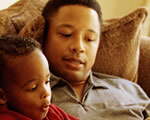 Go to main content
Go to main content
Archive Website of the UK government
Please note that this website has a UK government accesskeys system.
Main menu
Page menu
Parents

Learning with your under five child

You are your child's first teacher and understand them better than anyone else. By talking to them, playing with them and introducing simple skills you can help them in their future development.
Talking and listening to your child
The quickest development of your child's brain takes place between their birth and the age of two. Your child continues to learn and develop rapidly during the important early years of their life.
By building a few simple learning games into your child's daily routines and helping them investigate their environment, you can help give them the best possible start to their education.
You help your child to learn by giving them opportunities to:
- look at interesting things, in the garden or in the home
- touch a variety of objects
- listen to a range of sounds like songs, rhymes, stories, music
- taste a range of flavours
- investigate things that open, close, float, sink, twist, turn
- explore objects like large boxes, things that make noises and things that move
- play for uninterrupted periods, alone or with others, with help from adults, and in their own way
- talk to other children and adults
Reading together
Everywhere you go with your child you have a chance to read together. Whether it's on the bus, in shops or at the post office, you can point out the words around you and that's the beginning of reading. Reading stories with your child, even if for just 10 minutes a day, will help to build important skills, as well as capture your child's interest in books.
Learning about numbers and shapes
Counting things and noticing shapes come naturally to children, so you can use your child's interest in these activities to help with maths. Maths skills can be developed through stories, songs, games and imaginative play. Even helping in everyday tasks like telling time or measuring ingredients for cooking, gives children the chance to learn new maths skills.
Spending quality time together
Turning off the television or computer and spending time with your child creates valuable opportunities for learning. Here are a few ideas about activities that your child can learn from:
- pottering around the garden together teaches children about plant life, insects and animals
- simple kitchen tasks, like letting your child spread the jam on sandwiches, can give an early lesson in cooking and improve motor skills
- playing games together teaches fair play and cooperative behaviour
- family and holiday photos can give lessons in family history and geography
 Facebook
Facebook Twitter
Twitter StumbleUpon
StumbleUpon Delicious
Delicious Reddit
Reddit